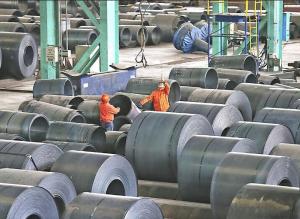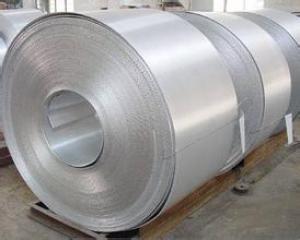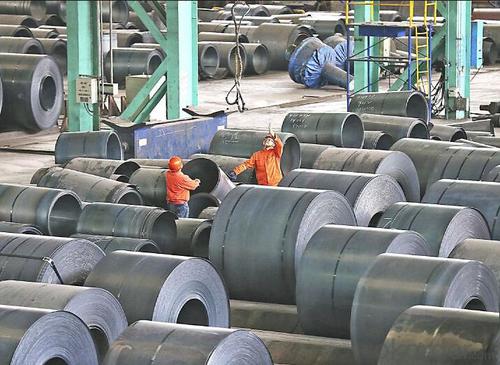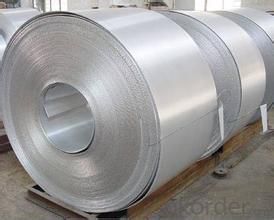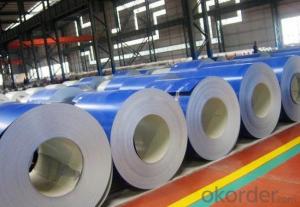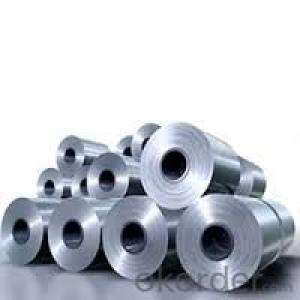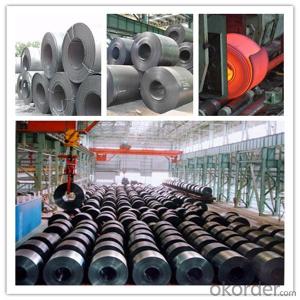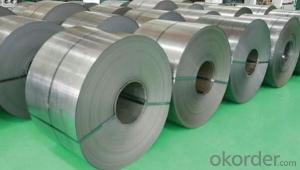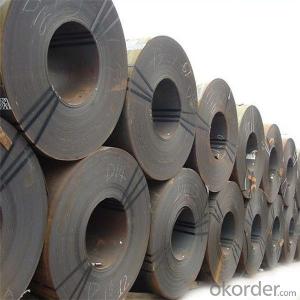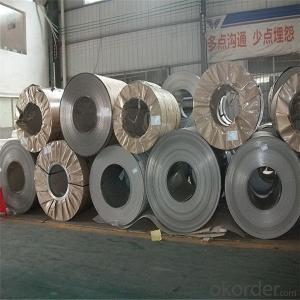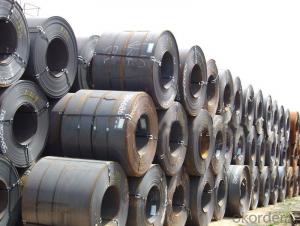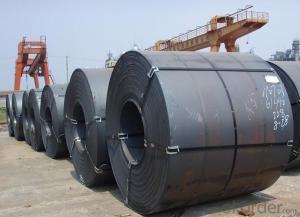HR Carbon Steel Coil ASTM A36
- Loading Port:
- China Main Port
- Payment Terms:
- TT or LC
- Min Order Qty:
- -
- Supply Capability:
- -
OKorder Service Pledge
OKorder Financial Service
You Might Also Like
Quick Details
| Standard: | ASTM,GB,JIS | Grade: | ASTM A36,Q235,SS400 | Thickness: | 3-15mm |
| Place of Origin: | Shanxi/Hebei China (Mainland) | Model Number: | carbon steel coil | ||
| Type: | Steel Coil | Technique: | Hot Rolled | Surface Treatment: | passivation,oiled, |
| Application: | normally | Special Use: | High-strength Steel Plate | Width: | 1250-2000mm |
| Length: | as required |
Packaging & Delivery
| Packaging Detail: | Standard waterproof packing |
| Delivery Detail: | Within 15-30 days after receiving your L/C |
Specifications
1.Standard:GB,ASTM,JIS
2.Grade:ASTM A36,Q235,SS400
3.Thickness:3-15mm
4.Width:1250-2000mm
5.Packaging: Standard waterpoof packing or as required.
6.Payment Terms: L/C or T/T
7.Delivery: by shipment
FAQ of Steel Coil:
①How is the quality of your products?
Our products are manufactured strictly according to national and internaional standard, and we take a test
on every coil before delivered out. If you want see our quality certifications and all kinds of testing report, please just ask us for it.
Guaranteed: If products’ quality don’t accord to discription as we give or the promise before you place order, we promise 100% refund.
②How about price?
Yes, we are factory and be able to give you lowest price below market one, and we have a policy that “ for saving time and absolutely honest business attitude, we quote as lowest as possible for any customer, and discount can be given according to quantity.
③Why should you chose us?
Our service formula: good quality+good price+good service=customer’s trust
SGS test is available, customer inspection before shipping is welcome, third party inspection is no problem.
Steel Coil Images:
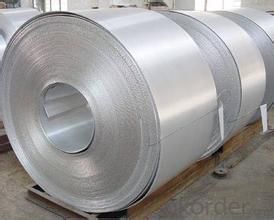
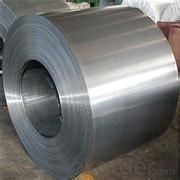
- Q: what is the difference between METAL and STEEL?
- Steel is a type of metal. There are many types of metals - some are simple elements such as copper, tin, iron or lead whilst others are mixtures of elements known as alloys such as bronze, brass... and steel. EDIT - and yes, once again Wikipedia has led someone astray. Metals are NOT exclusively elements. Metals are defined by their properties of being ductile, malleable and sonerous. Thus metals include both elements and alloys. Or is someone seriously proposing that a person building a steel structure such as a ship is not working in metal?
- Q: What is the diffrent Aluminized steel Type 1. stainless steel 409 430?
- Alloy steel is a stainless steel. The differences between the two are the composition of the metal. Alloy steel is steel with usually less than 5% of other elements, like molybdenum, copper, chrome while stainless steel is a steel with at least 10-11% of chromium.
- Q: why does steel have a density range when other metals do not?
- Steel is not a pure element it is an alloy. Steel is primarily iron but it has many elements blended in that change it's density including carbon,silicon, nickel, chrome, etc. Aluminum and copper , magnesium and so forth can be the pure element or they can be alloys too. If they are alloys, then their densities vary also
- Q: I want to start getting throwing knives and i was wondering what material is best for quality, but still cheap. I also saw some 440 stainless steel knives that i liked and wanted to know if the material was good
- Good steel ain't cheap, cheap steel ain't good... If you're just starting out (practicing anyways), I would be less concerned about the material and more concerned about the style and shape of the blade to gain consistency in your technique... When you start getting proficient for competitions and such... then I'd start investigating steel grades... Anyways, here's a summary from the wiki: Type 440—a higher grade of cutlery steel, with more carbon, allowing for much better edge retention when properly heat-treated. It can be hardened to approximately Rockwell 58 hardness, making it one of the hardest stainless steels. Due to its toughness and relatively low cost, most display-only and replica swords or knives are made of 440 stainless. Available in four grades: 440A, 440B, 440C, and the uncommon 440F (free machinable). 440A, having the least amount of carbon in it, is the most stain-resistant; 440C, having the most, is the strongest and is usually considered more desirable in knifemaking than 440A, except for diving or other salt-water applications.
- Q: What are the main factors that affect the flatness of steel coils?
- The main factors that affect the flatness of steel coils are the quality and thickness of the steel material, the tension and speed of the rolling process, the temperature and cooling rate during the cooling process, and any potential defects or imperfections in the machinery used for rolling and cooling the steel coils.
- Q: How are steel coils used in the production of steel drums?
- Steel coils are used in the production of steel drums by being unwound and shaped into circular sheets. These sheets are then formed into the body of the drum, providing the necessary strength and durability.
- Q: How do steel coils contribute to energy efficiency in transportation?
- Steel coils are essential in energy-efficient transportation due to their lightweight yet strong nature. The use of steel coils in vehicles, such as cars and trucks, reduces the overall weight of the vehicle, enhancing fuel efficiency and reducing carbon emissions. Additionally, steel coils are often used in rail transportation, where their durability and strength contribute to the energy efficiency of trains by allowing for higher speeds and improved load carrying capacity.
- Q: What are the different coil surface finishes?
- There are several different coil surface finishes, including mill finish, brushed finish, embossed finish, and coated finish.
- Q: How are steel coils manufactured?
- Steel coils undergo a series of procedures that convert raw materials into the end product. The manufacturing journey commences with the extraction of iron ore, which is later smelted in a blast furnace to yield pig iron. The pig iron is then refined in a basic oxygen furnace to eliminate impurities and regulate the carbon content. Once the molten steel is acquired, it is continuously molded into substantial slabs or billets. These slabs are subsequently rolled into thinner sheets or strips through hot rolling. This process entails passing the steel through a sequence of high-pressure rollers that reduce its thickness and shape it to the desired dimensions. Simultaneously, the steel undergoes treatment to enhance its mechanical attributes, such as strength and hardness. Following hot rolling, the steel is pickled and cleansed to eliminate any scale or impurities on its surface. It is then cold rolled to further decrease its thickness and improve its surface finish. Cold rolling necessitates passing the steel through a set of rollers at room temperature, thus augmenting its strength and dimensional accuracy. To form steel coils, the cold-rolled steel is typically tightly wound into a large coil shape. This is accomplished by feeding the steel strip through a sequence of rollers that gradually spiral it. Subsequently, the coils are typically annealed to alleviate internal stresses and enhance the material's formability. Lastly, the steel coils are coated or treated, depending on their intended application. This may involve the application of a protective coating, such as zinc or paint, to enhance corrosion resistance, or the provision of a specific surface treatment to improve adhesion in subsequent processes. All in all, the manufacture of steel coils is a multifaceted procedure encompassing stages such as smelting, casting, hot rolling, cold rolling, coiling, and surface treatment. Each step contributes to the quality and properties of the final product, ensuring that steel coils fulfill the required specifications for diverse industrial applications.
- Q: How are steel coils used in the production of appliances?
- Steel coils are used in the production of appliances as a primary material for constructing the various components, such as the outer shells, frames, and internal structures. The coils are processed and shaped into specific sizes and forms to meet the requirements of different appliances. Additionally, steel coils provide strength, durability, and a sleek appearance to the finished appliances.
Send your message to us
HR Carbon Steel Coil ASTM A36
- Loading Port:
- China Main Port
- Payment Terms:
- TT or LC
- Min Order Qty:
- -
- Supply Capability:
- -
OKorder Service Pledge
OKorder Financial Service
Similar products
Hot products
Hot Searches
Related keywords
